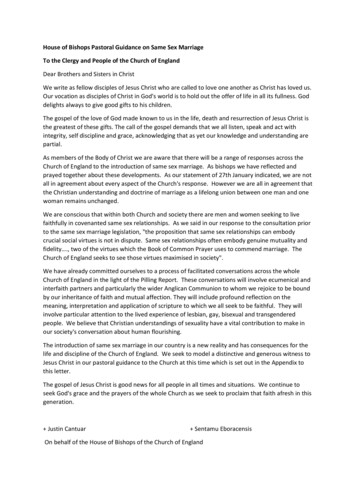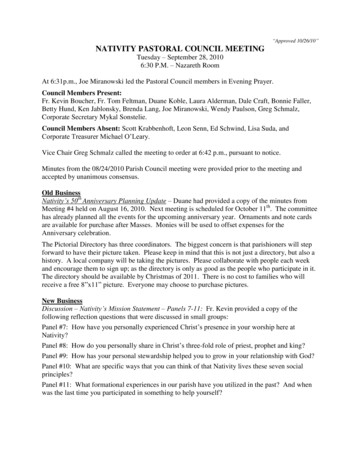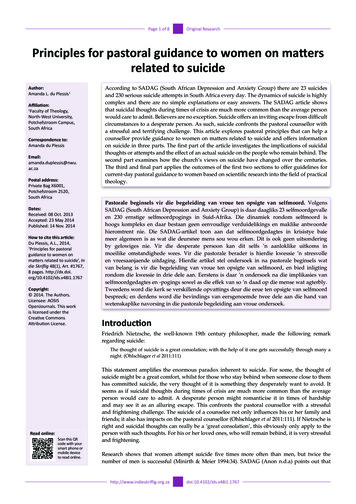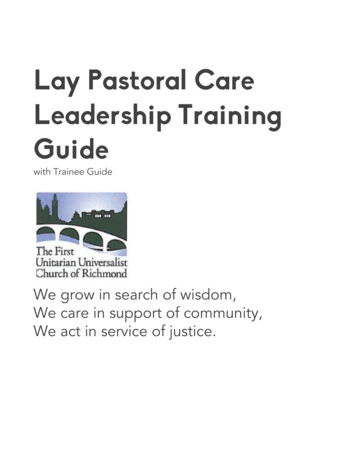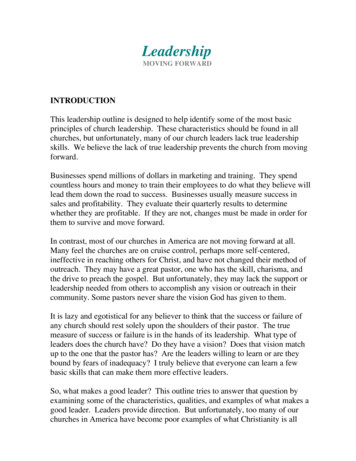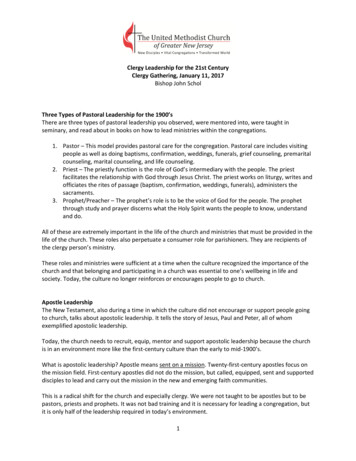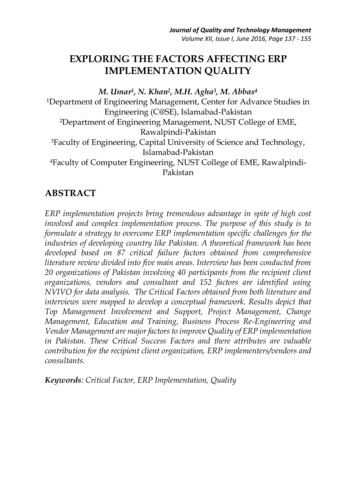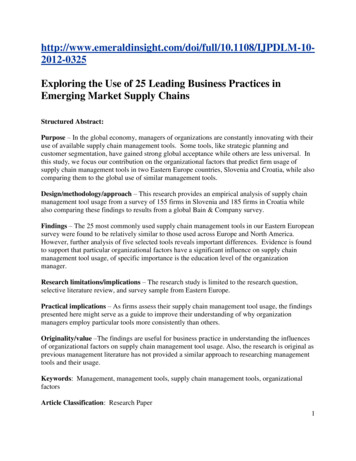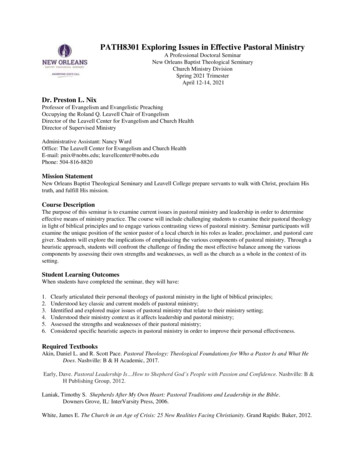
Transcription
PATH8301 Exploring Issues in Effective Pastoral MinistryA Professional Doctoral SeminarNew Orleans Baptist Theological SeminaryChurch Ministry DivisionSpring 2021 TrimesterApril 12-14, 2021Dr. Preston L. NixProfessor of Evangelism and Evangelistic PreachingOccupying the Roland Q. Leavell Chair of EvangelismDirector of the Leavell Center for Evangelism and Church HealthDirector of Supervised MinistryAdministrative Assistant: Nancy WardOffice: The Leavell Center for Evangelism and Church HealthE-mail: pnix@nobts.edu; leavellcenter@nobts.eduPhone: 504-816-8820Mission StatementNew Orleans Baptist Theological Seminary and Leavell College prepare servants to walk with Christ, proclaim Histruth, and fulfill His mission.Course DescriptionThe purpose of this seminar is to examine current issues in pastoral ministry and leadership in order to determineeffective means of ministry practice. The course will include challenging students to examine their pastoral theologyin light of biblical principles and to engage various contrasting views of pastoral ministry. Seminar participants willexamine the unique position of the senior pastor of a local church in his roles as leader, proclaimer, and pastoral caregiver. Students will explore the implications of emphasizing the various components of pastoral ministry. Through aheuristic approach, students will confront the challenge of finding the most effective balance among the variouscomponents by assessing their own strengths and weaknesses, as well as the church as a whole in the context of itssetting.Student Learning OutcomesWhen students have completed the seminar, they will have:1.2.3.4.5.6.Clearly articulated their personal theology of pastoral ministry in the light of biblical principles;Understood key classic and current models of pastoral ministry;Identified and explored major issues of pastoral ministry that relate to their ministry setting;Understood their ministry context as it affects leadership and pastoral ministry;Assessed the strengths and weaknesses of their pastoral ministry;Considered specific heuristic aspects in pastoral ministry in order to improve their personal effectiveness.Required TextbooksAkin, Daniel L. and R. Scott Pace. Pastoral Theology: Theological Foundations for Who a Pastor Is and What HeDoes. Nashville: B & H Academic, 2017.Early, Dave. Pastoral Leadership Is How to Shepherd God’s People with Passion and Confidence. Nashville: B &H Publishing Group, 2012.Laniak, Timothy S. Shepherds After My Own Heart: Pastoral Traditions and Leadership in the Bible.Downers Grove, IL: InterVarsity Press, 2006.White, James E. The Church in an Age of Crisis: 25 New Realities Facing Christianity. Grand Rapids: Baker, 2012.
Course Teaching MethodologyThe teaching methodology of this seminar will consist of student research and written assignments as well as thesharing and presentation of papers. Brief lecture by the professor and guided discussion will be included.Course Requirements and ScheduleBefore the Seminar:1.Read the Early textbook and select four (4) chapters from each of the five (5) Parts in the book. Compose aone-half page Reaction to each of the selected chapters (5 Parts x 4 chapters per Part for a total of 20Reactions). The half-page Reactions are to be single-spaced, with the chapter title listed for each, and maybe formatted to include two Reactions on one page, for a total of 10 pages of content. First person isallowed for this assignment. The Reactions should include agreements/disagreements with the author andthe importance of this issue in the student’s ministry setting/context.2. Read the White textbook and write a Personal Reflection paper, to answer the following: Of the topicscovered in the textbook, (a) which five were the most surprising to the student and why? (b) which fivehave been the most challenging to the student and why? The discussion of (a) and (b) should include reallife examples from the personal experiences of the student. The Personal Reflection should beapproximately 6-8 pages in length. Format: single-spaced, a space between each single-spaced paragraph,with no paragraph indentions. Margins, pagination, and headings/subheadings should be in accordance withTurabian 9th edition. Documentations or quotes from the textbook can be referenced by endnotes, citing thepage number. Example: “We are living at the beginning of our future. The world is changing, and we needto recognize the nature of that change.” (12). First person is allowed also for this assignment.3.Read the Akin and Pace textbook and the Laniak textbook and then compose a Biblical Theology ofPastoral Ministry for the 21st century. The Biblical Theology should involve biblical and historicalinsights, principles, and observations from the textbooks and include significant implications for 21stcentury pastoral ministry. The Biblical Theology should reflect a synthesis of both textbooks. The BiblicalTheology should be 10-12 pages, utilizing the following format: double-spaced; margins, pagination,headings/subheadings, and footnotes should be in accordance with Turabian 9th edition. Documentations orquotes from the textbooks and biblical material should be referenced by footnotes. First person is notallowed in writing this assignment. This assignment will be graded for Turabian form and style inaddition to content. NOTE: The Biblical Theology paper also will be evaluated by the WritingAssessment Coordinator for grammar, writing style, and Turabian formatting. In addition to submittingthe paper to the professor, please email the assignment to Mrs. Phyllis Garrett at pgarrett@nobts.edu.She will evaluate the document by inserting comments and email the document back to the student.Assignments 1, 2, & 3 are to be submitted to Google Drive no later than 11:59 P.M., Sunday, April 11, 2021.Instructions for Submitting Assignments via Google Drive:All assignments for this course will be submitted via a shared folder on google.com/drive. You will receive aseparate email from Dr. Nix requesting that you share the folder, Exploring Issues. If you already have aGoogle Drive account, then simply accept the shared folder. If you do not have a Google Drive account,you will need to follow the instructions given by Google to create a free Google Drive account and thenaccept the shared folder.In the folder, Exploring Issues, you will find subfolders for each assignment. Save your assignment using your lastname and the name of the assignment (i.e. Smith.PersonalReflection), and upload the file in the appropriatefolder. Google Drive will automatically update everyone’s folder. Please save assignments in either a.DOCX, .RTF, or .PDF format.Important: Do not alter anyone’s file while it is in Google Drive (e.g., save comments in the file) or removeanyone’s file from the Google Drive folder, as that will alter or remove the file for everyone. Open the fileand “save as” to your computer before making notes.
During the Seminar:Seminar Presentations: Each seminar participant will be involved in seminar presentations and discussionsinvolving all three Pre-seminar assignments as per the instructions of the professor.Seminar Participation: Seminar participants are expected to be active participants in all sessions of the seminar.After the Seminar:1. Interview a pastor who is considered to be either a mentor or a role model (suggested length of the interview: onehour or less). The interview questions should relate to issues raised in the course. Write a four-page, single-spacedsummary and reaction to the interview. A list of the questions asked should be attached as a separate appendix. Theassignment may be done in informal style, first person allowed, but is not to be a verbatim of the interview.Students are advised to secure the person to be interviewed and the time for the interview prior to thebeginning of the seminar.2. Based on the readings, assignments, and seminar discussions in the seminar, each student will write a PersonalAssessment of their strengths and weaknesses in pastoral ministry (at least three strengths and three weaknesses).For each strength, discuss an action plan for maintaining the strength. For each weakness, discuss an action plan forimproving the weakness. Suggested length of the Personal Assessment: 8-10 pages, single-spaced, utilizing theformat described in Pre-seminar assignment #2.Both Post-seminar assignments are to be submitted to Google Drive no later than 11:59 P.M., Thursday, May27, 2021.Assignments for Students Taking the Seminar as a Directed Study:1. Directed Study students must complete and submit ALL of the assignments listed above by the due dates listed.2. Directed Study students will also develop an Annotated Bibliography of fifteen books (excluding the textbookslisted above). Each bibliographic entry should be one-half page in length and give a brief statement in regard to thepurpose of the book, the major themes of the book, and the strengths and weaknesses of the author’s viewpoint. Seewww.annotatedbibliographymaker.com for guidance.3. Directed Study students will select five (5) books from the following list and write a four-page (or less), singlespaced Annotated Review for each book (format the same as Directed Study Assignment #2 above), answering thefollowing questions:a. What is a summary of the book and its purpose?b. What are the strengths of the book for pastoral ministry and leadership?c. What are the weaknesses of the book regarding pastoral ministry and leadership?d. What are the applications and implications of the book for pastoral ministry and leadership in the 21 st century?Baxter, Richard. The Reformed Pastor: A Pattern of Personal Growth and Ministry. Regent College Pub., 2001.Bisagno, John. Pastor’s Handbook. Nashville: B & H, 2011.Bryant, James W. and Mac Brunson. The New Guidebook for Pastors. Nashville: Broadman and Holman, 2007.Cothen, Joe H. Equipped for Good Work: A Guide for Pastors. 3rd ed. Edited by Jerry N. Barlow. Gretna,LA: Pelican, 2012.Dale, Robert D. Pastoral Leadership: A Handbook of Resources for Effective Congregational Leadership.Nashville: Abingdon Press, 1986.
Early, Dave and Ben Gutierrez. Ministry Is How to Serve Jesus with Passion and Confidence. Nashville: B & HPublishing Group, 2010Klick, Jeffery A., Rodney A. Harrison and Glenn A. Miller. Pastoral Helmsmanship: The Pastor’s Guide toChurch Administration. N.p.: ICM Publishing, 2015.MacArthur Jr., John. Pastoral Ministry: How to Shepherd Biblically. Nashville: Thomas Nelson, 2005.Phillips, Jere L. Pastoral Ministry for the New Generation. Collierville, TN: Innovo Publishing, 2014.Russell, Bob. After 50 Years of Ministry: 7 Things I’d Do Differently & 7 Things I’d Do the Same. Chicago: MoodyPublishers, 2016.Swetland, Kenneth L. Facing Messy Stuff in the Church: Case Studies for Pastors and Congregations. GrandRapids: Kregel, 2005.Thompson, James W. Pastoral Ministry According to Paul. Grand Rapids: Baker Academics, 2006.Toler, Stan. Stan Toler’s Practical Guide for Pastoral Ministry. Indianapolis: Wesleyan Publishing House, 2007.Annotated Bibliography and Annotated Reviews from Directed Study students are to be submitted to GoogleDrive by 11:59 P.M., Thursday, May 27, 2021.Course EvaluationAssignments will be weighted approximately equal with room for the professor’s discretion in regard to assignmentsthat are particularly outstanding or substandard.Technical AssistanceFor assistance regarding technology, consult ITC (504-816-8180) or the following websites:1. Selfserve@nobts.edu - Email for technical questions/support requests with the Selfserve.nobts.edu site (Access toonline registration, financial account, online transcript, etc.).2. BlackboardHelpDesk@nobts.edu - Email for technical questions/support requests with the NOBTS BlackboardLearning Management System NOBTS.Blackboard.com.3. ITCSupport@nobts.edu - Email for general technical questions/support requests.4. www.NOBTS.edu/itc/ - General NOBTS technical help information is provided on this website.Help for Writing Papers at “The Write Stuff”NOBTS maintains a Writing Center designed to improve English writing at the graduate level. Students can receivewriting guides, tips, and valuable information to help in becoming a better writer.Plagiarism on Written AssignmentsNOBTS has a no tolerance policy for plagiarism. Plagiarism in certain cases may result in expulsion from theseminary. See the NOBTS Student Handbook for definition, penalties, and policies associated with plagiarism.Selected BibliographyAkin, Daniel L., and R. Scott Pace. Pastoral Theology: Theological Foundations for Who a Pastor Is andWhat He Does. Nashville: B & H Academic, 2017.Ammerman, Nancy T., Jackson W. Carroll, Carl S. Dudley, and William McKinney, eds. StudyingCongregations: A New Handbook. Nashville: Abingdon, 1998.Anderson, Leith. Dying for Change. Minneapolis: Bethany House, 1990.
Armstrong, John H., ed. Reforming Pastoral Ministry. Wheaton: Crossway Books, 2001.Bailey, Robert W. The Minister and Grief. New York: Hawthorn Books, Inc., 1976.Bandy, Thomas G. Moving Off the Map. Nashville: Abingdon, 1998.Barker, Joel Arthur. Future Edge: Discovering the New Paradigms of Success. New York: WilliamMorrow and Company, 1992.Baxter, Richard. The Reformed Pastor: A Pattern of Personal Growth and Ministry. Regent College Pub.,2001.Biles, Deron J., ed. Pastoral Ministry: The Ministry of a Shepherd. Nashville: B&H Academic, 2017.Bisagno, John R. Pastor’s Handbook. Nashville: B & H, 2011.Branson, Mark Lau, and Juan F. Martinez. Churches, Cultures, and Leadership: A Practical Theology ofCongregations and Ethnicities. Downers Grove, IL: IVP Academic, 2011.Bryant, James W., and Mac Brunson. The New Guidebook for Pastors. Nashville: B & H, 2007.Campbell, Barry. Toolbox for [Busy] Pastors. Nashville: Convention Press, 1998.Charles Jr., H.B. On Pastoring: A Short Guide to Living, Leading, and Ministering as a Pastor. Chicago:Moody Publishers, 2016.Cothen, Joe H. Equipped for Good Work: A Guide for Pastors. 3rd ed. Edited by Jerry N. Barlow. Gretna:Pelican, 2012. The Pulpit Is Waiting. Gretna: Pelican, 1998.Criswell, W.A. Criswell’s Guidebook for Pastors. Nashville: Broadman Press, 1980.Cowen, Gerald P. Who Rules the Church: Examining Congregational Leadership and ChurchGovernment: Nashville: B & H, 2003.Croft, Brian. The Pastor’s Ministry: Biblical Priorities for Faithful Shepherds. Grand Rapids: Zondervan,2015.Dale, Robert D. Pastoral Leadership: A Handbook of Resources for Effective Congregational Leadership.Nashville: Abingdon Press, 2001.Daman, Glenn. Shepherding the Small Church. Grand Rapids: Kregel, 2002.Duduit, Michael, ed. Handbook of Contemporary Preaching. Nashville: Broadman Press, 1992.Early, Dave. Pastoral Leadership Is.How to Shepherd God’s People with Passion and Confidence.Nashville: B & H Publishing Group, 2012.Early, Dave, and Ben Gutierrez. Ministry Is How to Serve Jesus with Passion and Confidence. Nashville:B & H Publishing Group, 2010.Farris, Stephen. Preaching that Matters. Louisville: Westminster John Knox Press, 1998.Fisher, David. The 21st Century Pastor. Grand Rapids, MI: Zondervan Publishing House, 1996.
Fry, John W. Jesus: The Pastor. Grand Rapids: Zondervan, 2000.Gerkin, Charles V. An Introduction to Pastoral Care. Nashville: Abingdon Press, 1997.Gibson, Scott M. Preaching with a Plan. Grand Rapids: Baker Books, 2012.Goodman, Thomas. The Intentional Minister. Nashville: Broadman and Holman, 1994.Granberg-Michaelson, Wesley. Future Faith: Ten Challenges Reshaping Christianity in the 21st Century.Minneapolis: Fortress Press, 2018.Harvey, Dave. Am I Called? The Summons to Pastoral Ministry. Wheaton, IL: Crossway, 2012.Hemphill, Ken. The Antioch Effect. Nashville: Broadman & Holman, 1994.Hicks, H. Beecher. On Jordan’s Stormy Banks: Leading Your Congregation Through the Wilderness ofChange. Grand Rapids: Zondervan, 2004.Hiscox, Edward T. The Star Book for Ministers, 2d rev. ed. Valley Forge, PA: Judson Press, 1994.Hobbs, J. R. The Pastor’s Manual. Nashville: Broadman Press, 1962.Horner, David. A Practical Guide for Life and Ministry: Overcoming 7 Challenges Pastors Face. GrandRapids: Baker Books, 2008.Howe, Leroy. A Pastor in Every Pew. Valley Forge: Judson Press, 2000.Hughes, R. Kent. The Pastor’s Book: A Comprehensive and Practical Guide to Pastoral Ministry.Wheaton: Crossway, 2015.Hunter, Rodney J., ed. Dictionary of Pastoral Care and Counseling. Nashville: Abingdon, 1990.Hybels, Lynne, and Bill Hybels. Rediscovering Church. Grand Rapids: Zondervan, 1995.Klick, Jeffery A., Rodney A. Harrison, and Glenn A. Miller. Pastoral Helmsmanship: The Pastor’s Guideto Church Administration. N.p.: ICM Publishing, 2015.Laniak, Timothy S. Shepherds After My Own Heart: Pastoral Traditions and Leadership in the Bible.Downers Grove, IL: InterVarsity Press, 2006.Lartey, Emmanuel Y. Pastoral Theology in an Intercultural World. Eugenn, OR: Wipf and Stock, 2013.Lawrence, Bill. Effective Pastoring. Nashville: Word Publishing, 1999.Lawrenz, Mel. The Dynamics of Spiritual Formation. Grand Rapids: Baker Books, 2000.Lewis, Robert, and Wayne Cordeiro. Culture Shift: Transforming Your Church from theInside Out. San Francisco: Jossey-Bass, 2005.Lutzer, Erwin. Pastor to Pastor: Tackling the Problems of Ministry. Grand Rapids: Kregel Publications,1998.MacArthur Jr., John. Pastoral Ministry: How to Shepherd Biblically. Nashville: Thomas Nelson, 2005.Macchia, Stephen A. Becoming a Healthy Church: 10 Characteristics. Grand Rapids: Baker Books, 1999.
Malphurs, Aubrey. Advanced Strategic Planning: A 21 st Century Model for Church and Ministry Leaders.3rd ed. Grand Rapids: Baker Books, 2013. Doing Church: A Biblical Guide for Leading Ministries through Change. Grand Rapids: KregelPublications, 1999. Ministry Nuts and Bolts: What They Don’t Teach Pastors in Seminary. 2nd ed. Grand Rapids:Kregel Publications, 2009.Maxwell, John. Developing the Leader Within You. Nashville: Thomas Nelson, 1993.McCalep Jr., George O. Faithful Over a Few Things: Seven Critical Church Growth Principles. Lithonia,GA: Orman Press, 1996.McIntosh, Gary L. One Size Doesn’t Fit All. Grand Rapids: Revell, 1999.McIntosh, Gary L. and Charles Arn. What Every Pastor Should Know: 101 Indispensable Rules of Thumbfor Leading Your Church. Grand Rapids: Baker Books, 2013.Means, James E. Effective Pastors for a New Century. Grand Rapids: Baker Books, 1993.Miller, Calvin. O Shepherd, Where Art Thou? Nashville: B & H, 2006. The Empowered Communicator. Nashville: Broadman & Holman, 1994. The Empowered Leader. Nashville: Broadman and Holman Publishers, 1995.Newton, Phil A. 40 Questions about Pastoral Ministry. Grand Rapids: Kregel Academic, 2021.Oden, Thomas C. Classical Pastoral Care. 4 vols. Grand Rapids: Baker Books, 1987. Pastoral Theology. San Francisco: Harper, 1983.Olsen, David T. Discovering Your Leadership Style: The Power of Chemistry, Strategy, andSpirituality. Downers Grove, IL: InterVarsity, 2014.Piper, John. Brothers, We Are Not Professionals. Nashville: Broadman and Holman, 2002.Phillips, Jere L. Pastoral Ministry for the New Generation. Collierville, TN: Innovo Publishing, 2014.Prime, Derek J. and Alistair Begg. On Being a Pastor: Understanding Our Calling and Work. Rev. andexpanded ed. Chicago: Moody Publishers, 2013.Purves, Andrew. Pastoral Theology in the Classical Tradition. Louisville: Westminster, 2001.Peterson, Eugene. Five Smooth Stones for Pastoral Work. Grand Rapids: Eerdmans Pub., 1980. The Contemplative Pastor. Grand Rapids: Eerdmans Pub., 1989.Piper, John. Brothers, We Are Not Professionals. Nashville: Broadman and Holman, 2002. Living in the Light: Money, Sex, & Power. North America: The Good Book Company, 2016.Radcliffe, Robert J. Effective Ministry as an Associate Pastor. Grand Rapids: Kregel Publications, 1998.
Rainer, Thom S. Eating the Elephant. Nashville: Broadman and Holman Publishers, 1994.Ramey Jr., Robert H. The Pastor’s Start-Up Manual. Nashville: Abingdon, 1995.Rediger, G. Lloyd. Fit to Be Pastor. Louisville: Westminster John Knox Press, 2000.Rohrer, David. The Sacred Wilderness of Pastoral Ministry: Preparing a People for the Presence of theLord. Downers Grove, IL: InterVarsity Press, 2012.Russell, Bob. After 50 Years of Ministry: 7 Things I’d Do Differently & 7 Things I’d Do the Same. Chicago:Moody Publishers, 2016.Segler, Franklin M. The Broadman Minister’s Manual. Nashville: Broadman Press, 1968.Senkbeil, Harold L. The Care of Souls: Cultivating a Pastor’s Heart. Bellingham, WA: Lexham Press,2019.Senkbeil, Harold L. and Lucas V. Woodford. Pastoral Leadership and Strategy: For the Care of Souls.Lexham Ministry Guides, Vol. 1. Bellingham, WA: Lexham Press, 2021.Shawchuck, Norman, and Roger Heuser. Leading the Congregation: Caring for Yourself While Serving thePeople. Nashville: Abingdon Press, 1993.Stetzer, Ed, and Thom S. Rainer. Transformational Church: Creating a New Scorecard for Congregations.Nashville: B & H Publishing, 2010.Stevens, R. Paul., and Phil Collins. The Equipping Pastor. The Alban Institute, 1993.Stott, John. Basic Christian Leadership. Downers Grove, IL: InterVarsity Press, 2006.Stowell, Joseph M. Shepherding the Church in the 21st Century. Wheaton, IL: Victor Books, 1994.Sweet, Leonard. Aqua Church. Loveland, CO: Group Publishing, 1999.Swetland, Kenneth L. Facing Messy Stuff in the Church: Case Studies for Pastors and Congregations.Grand Rapids: Kregel, 2005.Thomas, Curtis. Practical Wisdom for Pastors. Wheaton: Crossway Books, 2001.Thompson, James W. Pastoral Ministry According to Paul. Grand Rapids: Baker Academics, 2006.Toler, Stan. Stan Toler’s Practical Guide for Pastoral Ministry. Indianapolis: Wesleyan PublishingHouse, 2007.Tripp, Paul David. Dangerous Calling: Confronting the Unique Challenges of Pastoral Ministry.Wheaton, IL: Crossway, 2012.Troftgruben, Troy M. Rooted and Renewing: Imagining the Church’s Future in Light of Its New TestamentOrigins. Minneapolis: Fortress Press, 2019.Warneck, Richard H. Pastoral Ministry: Theology and Practice. St. Louis: Concordia Publishing House,2018.Warren, Rick. The Purpose Driven Church. Grand Rapids: Zondervan, 1995.
White, James Emery. Meet Generation Z: Understanding and Reaching the New Post-Christian World.Grand Rapids: Baker Books, 2017. The Church in an Age of Crisis: 25 New Realities Facing Christianity. Grand Rapids: BakerBooks, 2012. What They Didn’t Teach You in Seminary: 25 Lessons for Successful Ministry in YourChurch. Grand Rapids: Baker Books, 2011.Wiersbe, David W. The Dynamics of Pastoral Care. Grand Rapids: Baker Books, 2000.Willhite, Keith, and Scott M. Gibson. The Big Idea of Biblical Preaching. Grand Rapids: Baker Books,1998.Wilson, Jared C. Gospel-Driven Ministry: An Introduction to the Calling and Work of a Pastor. Nashville:Zondervan, 2021.Wilson, Jim. L. Pastoral Ministry in the Real World: Loving, Teaching, and Leading God’s People. 2nd ed.Bellingham, WA: Lexham Press, 2018.Wilson, Michael Todd, and Brad Hoffman. Preventing Ministry Failure. Downers Grove, IL: InterVarsityPress, 2007.Witmer, Timothy Z. The Shepherd Leader: Achieving Effective Shepherding in Your Church. Phillipsburg,New Jersey: P & R Publishing, 2010.Wofford, Jerry C. Transforming Christian Leadership: 10 Exemplary Church Leaders. Grand Rapids:Baker Books, 1999.Woolever, Cynthia, and Deborah Bruce. A Field Guide to U.S. Congregations. Louisville: WestminsterJohn Knox Press, 2002. Beyond the Ordinary: Ten Strengths of U.S. Congregations. Louisville: Westminster John KnoxPress, 2004.
The purpose of this seminar is to examine current issues in pastoral ministry and leadership in order to determine effective means of ministry practice. The course will include challenging students to examine their pastoral theology in light of biblical principles and to engage various
